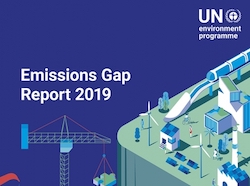
An Open Source License for the Climate Crisis
When the Open Austin core team met in 2017 to write a statement of the values that would define Open Austin as an organization, including “Open Data,” “Open Research,” and “Open Source Technology,” nothing in that mission statement referenced environmental sustainability. That omission reflected the reasonable point of view that the climate and open data were basically separate issues, and an organization dedicated to working on one issue didn’t need to think much about the other.
But sometimes new information requires a different outlook. The recent United Nations “Emissions Gap” report has revealed that the harms from global warming are happening faster than projected, most countries are falling short of their commitments to cut emissions, and that “fundamental structural changes” are now needed to meet the crisis. According to one striking section of the report:
Climate protection and adaptation investments will become a precondition for peace and stability, and will require unprecedented efforts to transform societies, economies, infrastructures and governance institutions. At the same time, deep and rapid decarbonization processes imply fundamental structural changes are needed within economic sectors, firms, labour markets and trade patterns.
Still reeling from the impact of this devastating news, people everywhere are looking for ways to realign their economic and work choices to fit within the needed structural changes. For Open Austin, the challenge is not to become a climate nonprofit, but to be an open source nonprofit that remains relevant in a time of climate emergency. By releasing the Atmosphere Software Licenses, we’re taking a step toward meeting that challenge. The Atmosphere Licenses are designed to make open source works more environmentally responsible by creating an incentive for organizations that rely on open source to divest from fossil fuels. The Atmosphere licenses are inspired by the Ethical Source movement, but they’re carefully drafted so they still fall within the Open Source Definition. If you choose to license your open source project under an Atmosphere license instead of an established license like the GPL or the MIT License, then everyone will still be free to read or run your software. But if a user or organization wants to engage more deeply with the software by modifying it and then republishing it or serving it to others over the internet, then the Atmosphere License will only permit them to do so if they’ve divested from fossil fuels.
There are many different reasons that people release open source software, ranging from commercial to altruistic and beyond. That means an Atmosphere license won’t be appropriate for every project. But in the “new normal” of the climate crisis, if a developer releases open source software for free with the motive of creating a benefit for the public, then fossil fuel divestment should be a baseline expectation of any user organization that relies extensively on the software. Otherwise, the software could easily end up doing more harm than good.
Like any other Code for America Brigade project, the Atmosphere License website is a perpetual work in progress, created with volunteer labor. It could use help from experts in design and usability, and the license text is still subject to revision in future versions pending the input of policy and legal experts. If you’d like to get involved, check out the #p-atmosphere-license channel of the Open Austin community on Slack: Get an invite
Continue the Conversation
RSVP for our future events on Meetup: RSVP